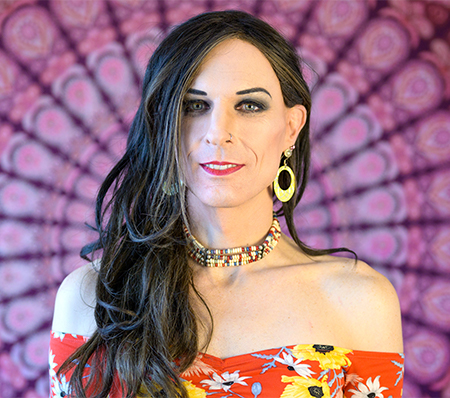It is revolutionary for any trans person to choose to be seen and visible
in a world that tells them they shouldn’t exist.
– Laverne Cox
 Being transgender has ups and downs.
Being transgender has ups and downs.
Discovering that you are transgender can be exhilarating, frustrating, scary, and funny.
You stop daydreaming about being a guy and become the guy. Instead of wondering why the gender binary doesn’t seem to fit, you realize you don’t have to have a gender.
Or maybe you’ve eyed a fantastic empire waist summer dress and decided it would look great with your beard. You add the dress excitedly to your cart, imagining yourself twirling on the dance floor of your sibling’s wedding.
So many exciting new experiences await you, but some people won’t get them.
 Going public is the next step. Right?
Going public is the next step. Right?
Evolving from your gender at birth to the gender you feel inside yourself with every fiber of your humanity can be an exciting time, especially if you have decided to take all that you are public.
Everything you have felt inside yourself and hidden will be displayed after you transition. You deserve to celebrate this time, but inevitably there will be some pushback.
Family members, friends, and employers may reject the authentic you. Your friends might act weird, and let’s face it, some issues and groups within our society are hostile to all our queer identities, but the center of their target is the trans community.
In transgender/non-binary affirming therapy, we are here to celebrate and guide you through the coming process.
 Embracing Your Trans/ Non-Binary Identity with Joy.
Embracing Your Trans/ Non-Binary Identity with Joy.
There are times you catch yourself looking in the mirror. You see you. A glimpse of you. A peak at who you could be. At that moment, you feel peace flooding through your entire body. In that moment, you know who you are. You feel it, euphoria. So affirming and so real.
Five seconds later, a barista is shouting your name and misgendering you, and that moment of euphoria slipped away, and the reality of your struggle slams you right in the face.
As you experiment with masculine or feminine presentations, you develop your style and self-concept. You are paying attention to what feels right for you and what feels wrong. When something feels right, it gives you joy and a sense of well-being. You feel drawn to that expression, and it gives your gender euphoria. That is an exhilarating feeling and should be embraced and celebrated.
We want to be here to help you celebrate. To mark each transition and enjoy the process.
Transgender/Non-Binary Affirming Psychotherapy offers guidance.
Gender Affirming Psychotherapy is a therapeutic stance that focuses on affirming one’s gender identity and does not try to ‘repair it.’
Every individual’s gender journey is different. Gender is not binary; it is a spectrum. Suppose you grew up in a place or community where gender-variant expressions were unwelcome. In that case, you may have felt discouraged from thinking about or exploring other expressions of identity than your birth-assigned sex.
We can help you explore who you are.
We have an expanding vision of gender identities and expressions. Our support can begin when a person is initially wondering about their gender identity to charting a course through the medical and legal steps necessary to transition to their most authentic self.
Our support includes writing gender confirmation surgery letters for clients desiring medically to transition to their most authentic selves. We follow the World Professional Association for Transgender Healthcare Standards of Care 8 (WPATH SOC 8) guidelines for all surgery letters.
We are not gatekeepers for those who desire to transition, and you are not required to be in therapy with us to ask us to write a gender confirmation letter.
 Transgender/Non-Binary Mental Health
Transgender/Non-Binary Mental Health
Many individuals in the trans and non-binary communities experience mental health symptoms associated with painful emotional and physical abuse by close loved ones and trusted members of their community. The daily and lifelong marginalization experienced by trans and non-binary communities leads to anxiety, fear, isolation, and hopelessness. When traumatic events are chronic and repetitive, the symptoms of trauma become more complex.
If you are experiencing difficulty managing emotions, we are here to help.

